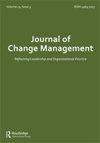让大家行动起来:通过以解决方案为中心的沟通,激发并保持变革准备状态
IF 3
Q2 MANAGEMENT
引用次数: 8
摘要
让组织成员参与变革过程的规划和实施对于创造持久变革的动力至关重要。因此,参与性群体干预是组织发展的一个基本支柱。然而,我们对成功的群体干预的行为动力学知之甚少。为了解决这个缺点,我们分析了787分钟(N = 5507个编码语句)。使用滞后序列分析,我们测试了变革推动者的哪些言语行为引发了接受者的变革准备,并将其作为逐字逐句的反应来操作。此外,我们还探讨了接受者之间正在出现的动机传染过程。数据是从两个独立的样本中收集的。参与者参加了一个研讨会,旨在减少他们拖延的倾向(研究1)或增强他们的节能行为(研究2)。与以问题为中心的沟通相比,变革推动者的解决方案在两项研究中都刺激了变革准备。此外,接受者的变化陈述触发了其他接受者随后的变化陈述,为群体中的动机传染过程提供了初步证据。最后,与基于讲座的干预相比,只有节能研讨会在干预一个月后导致目标行为显著增加。在研讨会结束时,接受者的变革准备程度与这一增长有关。MAD声明我们为那些希望在群体中点燃和促进变革准备的变革推动者提供基于经验的沟通指南。依靠细粒度的交互编码,我们展示了以解决方案为中心的通信风格如何触发有利于更改的通信模式。在关注变革推动者和接受者之间的微观动力学之后,我们引入了变革动机传染的概念。也就是说,一个参与者表达变革意愿会增加另一个参与者也表达变革意愿的可能性。从干预的角度来看,我们的研究结果表明,参与式干预往往比基于讲座的干预更有效,可以引发持久的行为改变。本文章由计算机程序翻译,如有差异,请以英文原文为准。
Get the Crowd Going: Eliciting and Maintaining Change Readiness Through Solution-Focused Communication
ABSTRACT Involving organizational members in the planning and implementation of change processes is essential for creating the momentum for lasting change. Therefore, participatory group interventions are a fundamental pillar of organization development. Yet, we know little about the behavioural dynamics that characterize successful group interventions. To address this shortcoming, we analysed 787 minutes (N = 5507 coded statements) of real-time recordings between change agents and recipients. Using lag sequential analysis, we tested which verbal behaviours by change agents elicited recipients’ change readiness, operationalized as their verbatim responses. Furthermore, we explored emerging motivational contagion processes among recipients themselves. Data were collected from two independent samples. Participants took part in a workshop either aimed to reduce their tendency to procrastinate (Study 1) or to enhance their energy-saving behaviour (Study 2). The change agent’s solution-focused as opposed to problem-focused communication stimulated change readiness in both studies. Moreover, recipients’ change statements triggered subsequent change statements by other recipients, providing initial evidence for motivational contagion processes in groups. Finally, compared to a lecture-based intervention, only the energy-saving workshop led to a significant increase in the target behaviour one month after the intervention. Recipients’ change readiness at the end of the workshop was linked to this increase. MAD statement We offer empirically-based communication guidelines to change agents who wish to ignite and promote change readiness in groups. Relying on fine-grained interaction coding, we show how a solution-focused communication style triggers change-facilitating communication patterns. Next to a focus on the microdynamics unfolding between change agent and recipients, we introduce the concept of motivational contagion for change. That is, the expression of change readiness by one participant increases the likelihood that another participant also voices change readiness. From an intervention perspective, our findings show that participatory interventions tend to be more effective than lecture-based interventions to initiate lasting behaviour change.
求助全文
通过发布文献求助,成功后即可免费获取论文全文。
去求助
来源期刊

JOURNAL OF CHANGE MANAGEMENT
MANAGEMENT-
CiteScore
6.60
自引率
20.00%
发文量
14
期刊介绍:
Journal of Change Management is a multidisciplinary and international forum for critical, mainstream and alternative contributions - focusing as much on psychology, ethics, culture and behaviour as on structure and process. JCM is a platform for open and challenging dialogue and a thorough critique of established as well as alternative practices. JCM is aiming to provide all authors with a first decision within six weeks of submission.
 求助内容:
求助内容: 应助结果提醒方式:
应助结果提醒方式:


